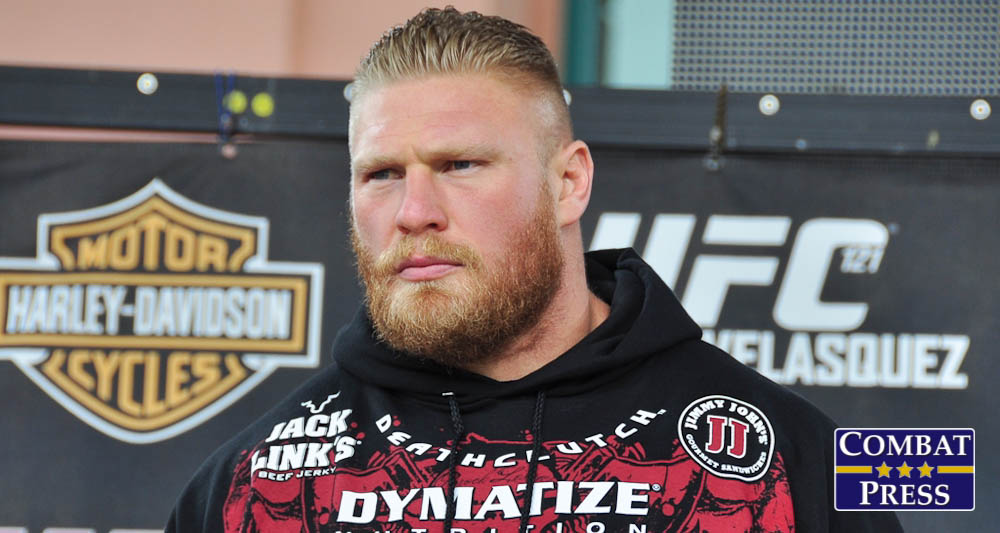This past week, Brock Lesnar ended years of speculation of a return to the Octagon by signing a multi-year contract with World Wrestling Entertainment (WWE), his home since retiring from active MMA competition after a knockout loss to Alistair Overeem in December 2011. Ever since that moment, speculative click-bait articles appeared on a regular basis, positing that everything from his appearance in the crowd at last month’s UFC 184 to the cycles of the moon meant for Lesnar’s return to his old stomping grounds in the UFC. Outside of UFC women’s bantamweight champion Ronda Rousey, the UFC lacks any one clear star, and had Lesnar chosen to step back into the cage after over three years away he would have provided an instant boost to recently lagging pay-per-view sales. And while Lesnar might have been able to carve out a respectable living squashing name heavyweights past their primes, the 37-year-old former heavyweight champion would never again have risen to the same heights he had previously enjoyed.
Whether it was in the Octagon or the professional wrestling ring, Lesnar was and will always remain an outsized performer, both in his persona and his physique. Few athletes could match Lesnar in terms of sheer muscle mass, even in the outrageous world of professional wrestling. Coupled with his over the top personality and sound bite worthy quips any time someone put a microphone in his face, it was easy to see why the fans, and therefore the brass at both the WWE and UFC, became so enthralled with the monster-sized Lesnar.
Lesnar stated that as he drove into the ESPN parking lot this past week to make his intent to re-sign with the WWE official, he received a phone call from the UFC doubling its previous offer to Lesnar for a return to MMA. You can count on one hand the amount of athletes the UFC would make that type of offer to, and you’d probably still have two or three fingers left. What would the UFC have received for its offer? Probably not what it wanted.
Inside the Octagon, Lesnar was a bully. He was bigger than you, stronger than you, and meaner than you. He quite simply bowled over the likes of Heath Herring and Randy Couture en route to the UFC heavyweight world championship. A mauling of Frank Mir in defense of his newly won title further cemented his reputation as an in-cage bully.
Like most bullies however, Lesnar did not enjoy being on the receiving end of the punishment he dished out. When Shane Carwin battered Lesnar close to a finish before gassing out himself, the blueprint for beating Lesnar was suddenly exposed. If you came right at Lesnar and did not back down, hit him with a few punches — or, in the case of Overeem, kicks — Lesnar would fold. Cain Velasquez was the first to capitalize where Carwin could not, seizing the heavyweight title, and Lesnar’s air of invincibility with it, via first-round TKO in late 2010.
Had Lesnar chosen to return to the UFC, the devastating wrecking-machine persona would have remained a thing of the past. In his absence, the UFC heavyweight division has grown in depth as well as talent. The days of beating the likes of the aforementioned Herring to earn a title shot are long gone, and in their place stand athletes such as Junior dos Santos, Stipe Miocic and current interim heavyweight champion Fabricio Werdum.
Lesnar could easily handle the lower-level guys on the roster, and he would also have no trouble with past-their-prime contenders, such as the one he would face in the proposed trilogy fight with Mir, but that would have been the extent of his success in a return to the Octagon.
Two battles with diverticulitis surely played their part, but the loss of Lesnar’s bully persona and the growth of talent in the division are the two strongest factors in the demise of Lesnar’s MMA career. The UFC would have surely welcomed him back, and the company would have undoubtedly seen a profit from his return, but Lesnar is better served by sticking where the punches are scripted.

